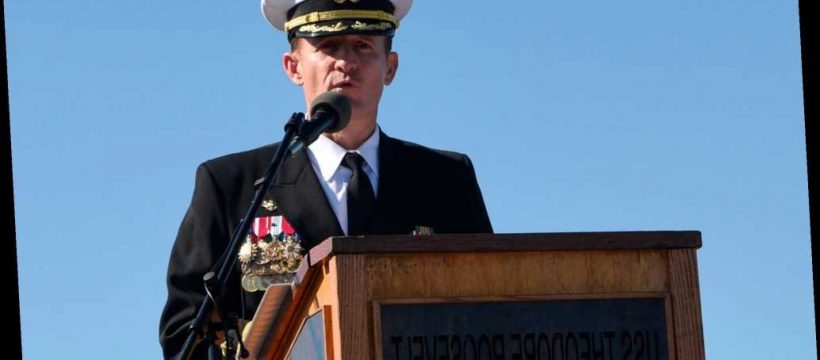Navy Capt. Brett Crozier was fired last week as commander of the aircraft carrier USS Theodore Roosevelt after complaining about the plight of his crew, which was being ravaged by the coronavirus on his ship. To put it bluntly, he got a raw deal.
The raucous cheer by the sailors and aircrew under his command when he left the Roosevelt drove home that point.
Perhaps when all the hoopla blows over and the captain recovers from the coronavirus — for which he has tested positive — the Navy can find a way to make things right by him.
Fact is, Acting Secretary of the Navy Thomas Modly’s decision to remove Crozier reflects the problematic way in which the administration has dealt with this virus.
Indeed, Modly and the Pentagon seem to have reacted to Crozier’s pleas for help as the virus swept through his ship as if it were a hostile question from a CNN reporter at a White House press conference. Perhaps they believed this was a way to please President Trump.
Yet Crozier’s dismissal was vindictive — more a product of resentment about complaints than evidence that the captain was guilty of a truly fireable offense.
The captain broke the rules by venting outside of the naval chain of command. He sent an e-mail to 20 people speaking about his concerns and, perhaps inevitably, someone leaked it to The San Francisco Chronicle, embarrassing Modly and the Pentagon.
The information about the conditions on board could be considered a military secret and officers who cross their superiors can always expect to face serious consequences.
But it was Modly’s decision to summarily fire the captain — who now is suffering from the coronavirus while in quarantine on Guam — not the e-mail that turned this into a national controversy.
And for Modly to subsequently fly out to Guam to angrily scold the crew for cheering their captain while all but calling him a traitor seems to be a more egregious example of bad judgment and poor leadership skills than anything Crozier did.
The timeline of this controversy is a matter of some dispute. But it’s obvious that Crozier felt his superiors were failing the Roosevelt. It’s impossible for outsiders to judge whether he was correct, but the captain weighed the need to bring attention to the problem against the possible repercussions and hit “send” on that e-mail.
In doing so, he likely ended a distinguished career that had put him in command of one of America’s most powerful warships.
Maintaining the chain of command is, of course, essential to a well-run military. But the same can be said of protecting the health of those who serve the nation at sea.
Placing the interests of those under his command over what would be good for his career is exactly what we should expect from naval officers.
And though punishing Crozier makes sense from a strictly military mindset, Modly’s decision to do it in such an abrupt and public manner rather than after a process that would have resulted in little publicity or public bad feelings was beyond foolish.
It matters, because it allowed administration critics to inflate the story into a metaphor for broader problems of accountability.
While Joe Biden was out of line to call Modly’s firing of Crozier “close to criminal,” the move was stupid and illustrated that Modly is a liability to both Trump and the country.
It also is wrong — deeply wrong — for the media and Democrats to politicize the administration’s understandably imperfect record during this extremely difficult-to-fight crisis.
Yet the worst mistake Trump and other officials can make now as they try to save lives is to treat questions about their decisions — even those that are clearly apolitical, like Crozier’s — like partisan broadsides.
Modly and the Navy would be ill-advised to stand by this decision and lose a valuable officer. They should rethink the move and look for a way to salvage his career and make things right.
The Navy’s higher-ups need to show that they share the respect that most Americans feel for the captain — and ensure that there is still a place for courageous men like him in the Navy.
Jonathan S. Tobin is editor in chief of JNS.org. Twitter: @jonathans_tobin
Source: Read Full Article
